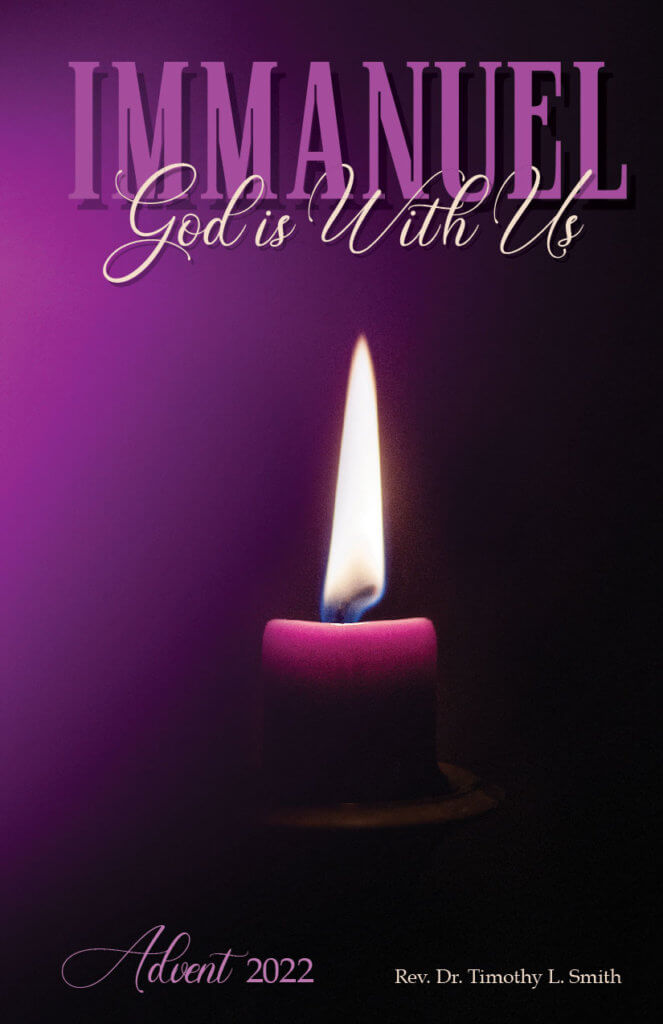PREPARATION: lighting the candle and readying myself to listen.
REFLECTION:
For in him the whole fullness of deity dwells bodily, and you have come to fullness in him, who is the head of every ruler and authority.
Colossians 2:9-10
Only a year after Charles Wesley’s conversion he wrote a poem of deep Biblical insight, titling it, “Hymn for Christmas Day.” Written in 1734, Wesley’s poem was later set to the music of Felix Mendelssohn and handed down as the beloved Christmas carol, “Hark! The Herald Angels Sing”. In his poem the young convert revels in the mystery of Immanuel, God is with us:
“…offspring of the Virgin’s womb
veiled in flesh the Godhead see;
hail th’incarnate Deity,
pleased as man with men to dwell,
Jesus, our Immanuel.”
The popular carol celebrates the little baby asleep in the manger as God Himself in the flesh, “God from God, Light from Light, true God from true God, begotten, not made, of one Being with the Father.” (From “The Nicene Creed”) God has joined Himself to us while never ceasing to be God, He is bone of our bone, flesh of our flesh, so that He might share with us all that He is. He takes what is ours to give us what is His.
J. R. R. Tolkien wrote such high fantasies as “The Lord of the Rings and The Hobbit, yet had to admit, “The incarnation of God is infinitely greater than anything I would dare to write.” (J. R. R. Tolkien, The Letters of J. R. R.) Theologian J. I. Packer would have agreed with Tolkien about the Incarnation: “The more you think about it, the more staggering it gets. Nothing in fiction is so fantastic as the truth of the Incarnation.” (J. I. Packer, Knowing God)
Here is love and self-giving beyond comprehension. “Mighty God” is the name of this Child (Isaiah 9:6), who in the beginning was with God and was God, who becomes flesh and lives with us (John 1:14). If you have ever wondered what God is like, consider this baby who perfectly expresses the grace and humble love of God. Baby Jesus is “the reflection of God’s glory and the exact imprint of God’s very being” (Hebrews 1:3). The glorious God is fully embodied in this Child born of the virgin. “In the fullness of his Deity he became man in the undiminished reality of human and creaturely being, without of course ceasing to be God the Son.” (Thomas Torrance, The Trinitarian Faith)
The false teaching that reared up early in Christianity denied the great central truth that Jesus is fully divine and fully human (1 John 2:22; 2 John 7). Some preached that Jesus is fully God but only half human, some said He is half God and half human, while others argued that Jesus is only a man and not God at all. It is against these false teachings that the apostle Paul in today’s scripture proclaims Jesus as the fullness of God embodied in humanity: “For in him the whole fullness of deity dwells bodily.” “Man was added to Him, God not lost to Him; He emptied Himself not by losing what He was, but by taking to Him what He was not.” (Saint Augustine, Homilies on the Gospel of John)
The Greek word translated here as “deity” is theotes, which expresses the very essence and nature of God. “It is not merely divine attributes that are in mind now, but the possession of the essence of deity in an absolute sense.” (Kenneth Wuest, Word Studies from the Greek New Testament, Vol. 3) This means that Immanuel Jesus is not merely God-like, but is God in the fullest sense. The fullness of divine being is in Jesus from His birth to His ascension as He carries human nature with Him into glory. And it is in His glorified human body that Jesus will come for us. Theologians emphasize the importance of Jesus’ full divinity and full humanity for our salvation: “If Jesus Christ the incarnate Son is not true God from true God, then we are not saved, for it is only God who can save; but if Jesus Christ is not truly man, the salvation does not touch our human existence and condition.” (Thomas Torrance, The Trinitarian Faith)
Paul is eager in today’s scripture for Christians to know that as “the whole fullness (Greek: pleroma) of deity dwells in Jesus, so we “have come to fullness (Greek: pleroma) in him.” Because of the fullness of life that we have in Christ Jesus, we lack nothing for our salvation and life. The Christian life is daily living out of the fullness that is ours in Immanuel.
We are often bombarded with messages that there is fullness in life found beyond Jesus. Many are the messages that we need “Jesus plus something…” But, the good news is that in Jesus we have everything we need for this life and the life to come! We have come to fullness in Him. We are complete in Him. May the Spirit of Christ, who lives within us, reveal to us more and more of the riches of our Savior.
CONVERSATION: I talk with God about the thoughts and feelings stirring within.
REST: I take time to be present to Immanuel who is present to me.



